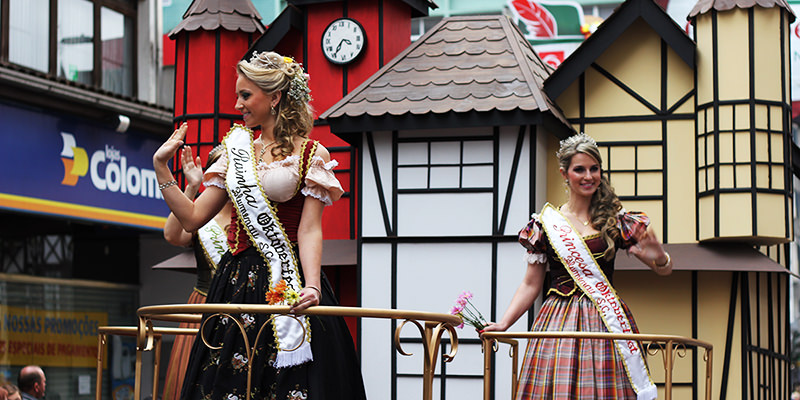
You don’t need to travel north to Germany to find an Oktoberfest complete with steins full of lager, a tent rooftop, and beer maids serving hundreds of thousands of people while wearing dirndls and lederhosen. In fact, you can go the complete opposite way: all the way down south to Brazil.
Blumenau, Brazil, a city of just over 300,000 people, is the location of the third-largest Oktoberfest in the world. It’s only smaller than the original in Munich and another north of us in Canada, but more on that later.
Official statistics from 2015’s Blumenau Oktoberfest show the event drew a crowd of 473,196 people who consumed 599,622 liters of beer. That’s the equivalent of 20,275,632 fluid ounces, or 1,689,636 standard 12-ounce beers. But that all pales to Blumenau’s Oktoberfest peak of 1,010,060 visitors in 1992, but enough math, let’s talk about what it’s like!
Blumenau’s Oktoberfest prominence (and fall from prominence) isn’t much of a surprise when history is taken into account. The city was founded on September 2, 1850 by a German pharmacist named Hermann Bruno Otto von Blumenau, the website Oktoberfest Brazil writes. Von Blumenau traveled inland from the Atlantic Ocean by boat with 17 German farmers via the Itajaí-Açu River. When they reached a stopping point, they disembarked and kicked the native people off the land, as European settlers were apt to do.
The settlers built the town of Blumenau German-style — pointed-roof haus and all — despite being in the tropical, Amazonian environment. The Germans eventually integrated and took on Portuguese, but a natural disaster in 1983 brought back out the people’s German roots.
That year, the Itajaí-Açu River, the same river responsible for the German population, flooded Blumenau. The city was still in need of a pick-me-up the following year, and the people reverted to their German ways. So in 1984, a full 174 years after the first-ever Oktoberfest in Munich, Blumenau organized its own Oktoberfest to “lift the mood and the economy of the city, and to celebrate the German identity and culture,” Oktoberfest Brazil writes.
The 16-day beer festival celebrates its 32nd anniversary in 2016. Many of the beers that are served are — surprise! — German-style beers (think Pilsner, Kölsch, Weissbier, and beers made following Reinheitsgebot). Brazil produces the third-most beer in the world and, until recently, had the second-largest Oktoberfest. But after 1995, attendance took a steady decline to today’s numbers. Blame it on systemic government corruption, crippling inflation, or that definitely-not-fake UFO landing the country had a hubbub about in 1996.
Whatever the case, the Kitchener-Waterloo Oktoberfest in Canada overtook Blumenau as second place. To be fair, Kitchener-Waterloo was literally named City of Berlin until World War I. Third place isn’t bad, though. Add in the much cheaper cost of Brazil and the warmer climate, and you might reconsider traveling north for a life-changing Oktoberfest experience.
